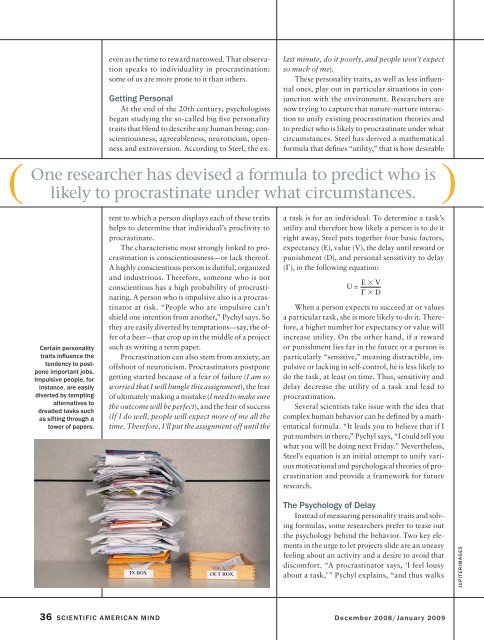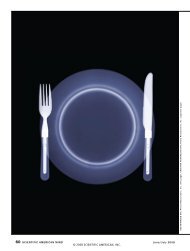Tomorrow - Trisha Gura
Tomorrow - Trisha Gura
Tomorrow - Trisha Gura
You also want an ePaper? Increase the reach of your titles
YUMPU automatically turns print PDFs into web optimized ePapers that Google loves.
even as the time to reward narrowed. That observation<br />
speaks to individuality in procrastination:<br />
some of us are more prone to it than others.<br />
getting Personal<br />
At the end of the 20th century, psychologists<br />
began studying the so-called big five personality<br />
traits that blend to describe any human being: conscientiousness,<br />
agreeableness, neuroticism, openness<br />
and extroversion. According to Steel, the ex-<br />
tent to which a person displays each of these traits<br />
helps to determine that individual’s proclivity to<br />
procrastinate.<br />
The characteristic most strongly linked to procrastination<br />
is conscientiousness—or lack thereof.<br />
A highly conscientious person is dutiful, organized<br />
and industrious. Therefore, someone who is not<br />
conscientious has a high probability of procrastinating.<br />
A person who is impulsive also is a procrastinator<br />
at risk. “People who are impulsive can’t<br />
shield one intention from another,” Pychyl says. So<br />
they are easily diverted by temptations—say, the offer<br />
of a beer—that crop up in the middle of a project<br />
such as writing a term paper.<br />
Procrastination can also stem from anxiety, an<br />
offshoot of neuroticism. Procrastinators postpone<br />
getting started because of a fear of failure (I am so<br />
worried that I will bungle this assignment), the fear<br />
of ultimately making a mistake (I need to make sure<br />
the outcome will be perfect), and the fear of success<br />
(If I do well, people will expect more of me all the<br />
time. Therefore, I’ll put the assignment off until the<br />
last minute, do it poorly, and people won’t expect<br />
so much of me).<br />
These personality traits, as well as less influential<br />
ones, play out in particular situations in conjunction<br />
with the environment. Researchers are<br />
now trying to capture that nature-nurture interaction<br />
to unify existing procrastination theories and<br />
to predict who is likely to procrastinate under what<br />
circumstances. Steel has derived a mathematical<br />
formula that defines “utility,” that is how desirable<br />
( One researcher has devised a formula to predict who is )<br />
likely to procrastinate under what circumstances.<br />
certain personality<br />
traits influence the<br />
tendency to postpone<br />
important jobs.<br />
impulsive people, for<br />
instance, are easily<br />
diverted by tempting<br />
alternatives to<br />
dreaded tasks such<br />
as sifting through a<br />
tower of papers.<br />
a task is for an individual. To determine a task’s<br />
utility and therefore how likely a person is to do it<br />
right away, Steel puts together four basic factors,<br />
expectancy (E), value (V), the delay until reward or<br />
punishment (D), and personal sensitivity to delay<br />
(�), in the following equation:<br />
36 scientific american mind december 2008/January 2009<br />
U =<br />
E � V<br />
� � D<br />
When a person expects to succeed at or values<br />
a particular task, she is more likely to do it. Therefore,<br />
a higher number for expectancy or value will<br />
increase utility. On the other hand, if a reward<br />
or punishment lies far in the future or a person is<br />
particularly “sensitive,” meaning distractible, impulsive<br />
or lacking in self-control, he is less likely to<br />
do the task, at least on time. Thus, sensitivity and<br />
delay decrease the utility of a task and lead to<br />
procrastination.<br />
Several scientists take issue with the idea that<br />
complex human behavior can be defined by a mathematical<br />
formula. “It leads you to believe that if I<br />
put numbers in there,” Pychyl says, “I could tell you<br />
what you will be doing next Friday.” Nevertheless,<br />
Steel’s equation is an initial attempt to unify various<br />
motivational and psychological theories of procrastination<br />
and provide a framework for future<br />
research.<br />
the Psychology of delay<br />
Instead of measuring personality traits and solving<br />
formulas, some researchers prefer to tease out<br />
the psychology behind the behavior. Two key elements<br />
in the urge to let projects slide are an uneasy<br />
feeling about an activity and a desire to avoid that<br />
discomfort. “A procrastinator says, ‘I feel lousy<br />
about a task,’” Pychyl explains, “and thus walks<br />
JuPiterimage s



